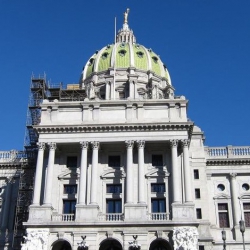
The House vote is expected in June, but proponents of online gambling can expect a tough legislative battle.
Pennsylvania State Representative John Payne’s online gambling bill is expected to be heard on the floor of the House in June. The bill has cleared hurdles in the Houes Gaming Oversight Committee, so the next stop is a vote on House floor. If it passes muster there, the bill would go to the Pennsylvania State Senate.
Rep. Payne’s bill is similar to the gaming laws of nearby New Jersey. The online gambling law would legalize online casinos and poker rooms. Existing land-based license holders would be given the right to apply for a license, with a one-time licensing fee of $5 million.
14% Tax Rate on Online Gambling
Revenues from these sites would be taxed at 14%. The taxes would helped Pennsylvania deal with a $1 billion budget shortfall. Gaming analysts believe Pennsylvania online gaming sites might be worth $400 million a year, though estimates for New Jersey were wildly off-target.
John Payne wants voters and politicians alike to know he does not think the house bill is the ultimate solution to the budget deficit. Payne thinks the bill could help eliminate some of the shortfall, while providing protections for Pennsylvanians who gamble online. The Dauphin County Republican says that online gambling takes place without government approval, so the best thing is to provide a licensed and regulated version, so gamblers do not play at the unregulated sites.
John Payne’s Statement
Rep. Payne told the Reading Eagle, “Is that the savior for the budget problem? No. But isn’t it the right thing to do to protect our children and compulsive gamblers?”
One cannot blame Rep. Payne for sounding a bit defensive. John Payne has come under serious criticism for his support of the online gambling bill. Sheldon Adelson’s anti-online gambling public policy group, CGIS, released an attack ad with a 6 or 7 year old child in it, implying that regulated online gambling sites would target children for illegal gambling. The same ad named John Payne by name.
Jim Pappas’s Statement
One positive sign is that certain groups who normally oppose any expansion of gambling have not attacked the current bill. Jim Pappas of the Council on Compulsive Gambling in Pennsylvania says he’s noncommittal on the issue, at least so far. Pappas said he wants lawmakers to keep in mind the problem gamblers of the state, which most gaming researchers believe represent about 2% of all gamblers.
Jim Pappas said, if new forms of gaming are approved, then more resources for gambling addicts should become available. Pappas said, “Whenever there’s talk of expanding gambling, we just want to see more money allocated for prevention and assistance.”
Tom Wolf’s Vote
One positive sign is that Gov. Tom Wolf once signaled he would support an online gambling bill. That was a number of months ago, before legislation stalled, and before a major lobbying effort against such a bill began.
Whether Gov. Wolf still plans on supporting the House bill, if it ever reaches his desk, is a bit more uncertain in the middle of 2016. While there is no indication the Pennsylvania governor is opposed to John Payne’s proposal, strange things happen in election years. Wolf does not face reelection until 2018, but many GOP allies do face reelection battles.
Need for a Balanced Budget
Gov. Wolf continues to call for a balanced budget. On March 23, he called for a “responsible and balanced” 2016-17 budget, pointing out that the state still has deficit of $290 million.
The governor said at the time, “Left unaddressed, the deficit will force cuts to schools and human services, downgrades that will cost taxpayers millions and increase property taxes for our senior citizens. We must face this reality this year and balance our budget with real, sustainable revenues.”
The quickest way to shore up the budget without raising taxes is to approve online gambling. Under the circumstances, all signs point to the lawmakers and executive of Pennsylvania agreeing on the online gambling solution. Once again, iGaming will not eliminate $290 million in budget shortfalls, but it might help get the budget office closer to balancing the budget, as the governor asks.
